BIZ102 Module 4: Reflective Journal 3 on Self-Assessment Results
VerifiedAdded on 2022/10/17
|6
|1491
|18
Report
AI Summary
This report presents a student's Reflective Journal 3 for the BIZ102: Understanding People and Organizations course. The assignment required the student to analyze the results of a self-assessment, specifically the LPA test, and reflect on their strengths and weaknesses in relation to workplace competencies. The student agrees with the assessment results, highlighting strengths in problem-solving, self-development, and adaptability, supported by examples from their school and work experiences. The student also identifies areas for improvement, such as teamwork and achieving objectives. The report then explores the theoretical concepts of self-awareness and emotional intelligence, which aid in understanding the assessment results and their implications for future career goals. Finally, the student identifies the most critical LPA competencies for success in a VUCA world, emphasizing problem-solving and the need to improve teamwork skills, leveraging self-development and learning abilities to achieve their career objectives.
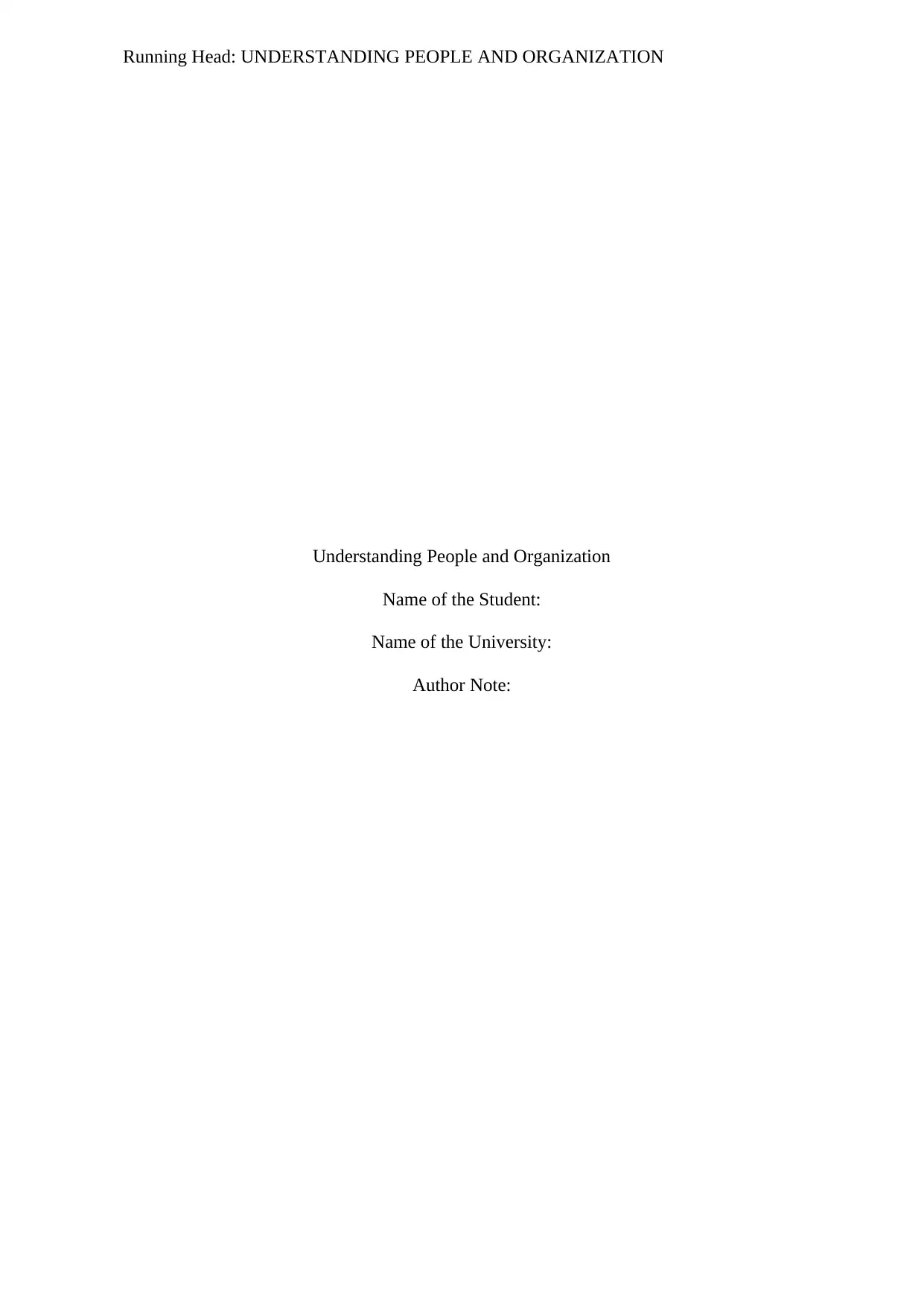
Running Head: UNDERSTANDING PEOPLE AND ORGANIZATION
Understanding People and Organization
Name of the Student:
Name of the University:
Author Note:
Understanding People and Organization
Name of the Student:
Name of the University:
Author Note:
Paraphrase This Document
Need a fresh take? Get an instant paraphrase of this document with our AI Paraphraser
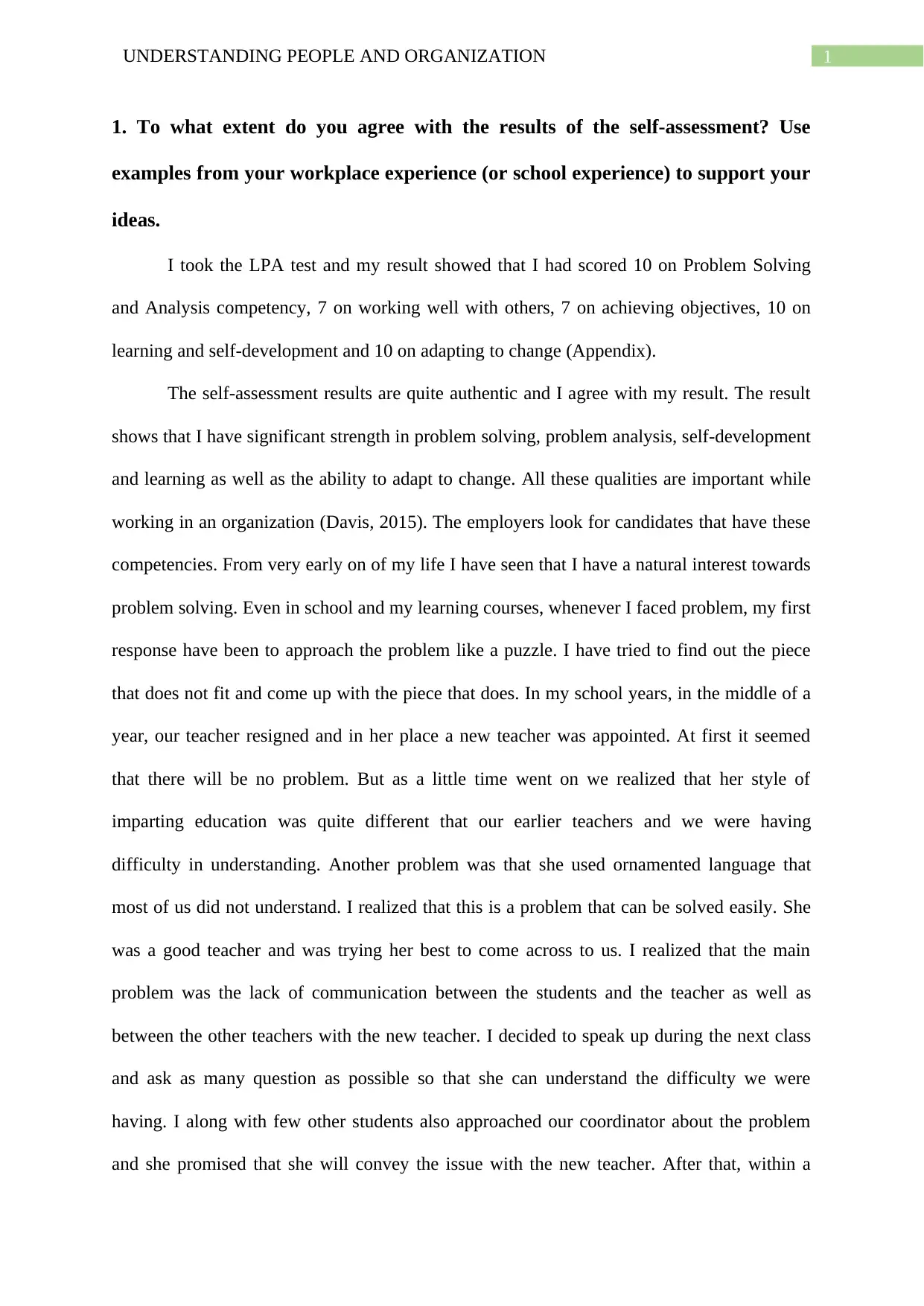
1UNDERSTANDING PEOPLE AND ORGANIZATION
1. To what extent do you agree with the results of the self-assessment? Use
examples from your workplace experience (or school experience) to support your
ideas.
I took the LPA test and my result showed that I had scored 10 on Problem Solving
and Analysis competency, 7 on working well with others, 7 on achieving objectives, 10 on
learning and self-development and 10 on adapting to change (Appendix).
The self-assessment results are quite authentic and I agree with my result. The result
shows that I have significant strength in problem solving, problem analysis, self-development
and learning as well as the ability to adapt to change. All these qualities are important while
working in an organization (Davis, 2015). The employers look for candidates that have these
competencies. From very early on of my life I have seen that I have a natural interest towards
problem solving. Even in school and my learning courses, whenever I faced problem, my first
response have been to approach the problem like a puzzle. I have tried to find out the piece
that does not fit and come up with the piece that does. In my school years, in the middle of a
year, our teacher resigned and in her place a new teacher was appointed. At first it seemed
that there will be no problem. But as a little time went on we realized that her style of
imparting education was quite different that our earlier teachers and we were having
difficulty in understanding. Another problem was that she used ornamented language that
most of us did not understand. I realized that this is a problem that can be solved easily. She
was a good teacher and was trying her best to come across to us. I realized that the main
problem was the lack of communication between the students and the teacher as well as
between the other teachers with the new teacher. I decided to speak up during the next class
and ask as many question as possible so that she can understand the difficulty we were
having. I along with few other students also approached our coordinator about the problem
and she promised that she will convey the issue with the new teacher. After that, within a
1. To what extent do you agree with the results of the self-assessment? Use
examples from your workplace experience (or school experience) to support your
ideas.
I took the LPA test and my result showed that I had scored 10 on Problem Solving
and Analysis competency, 7 on working well with others, 7 on achieving objectives, 10 on
learning and self-development and 10 on adapting to change (Appendix).
The self-assessment results are quite authentic and I agree with my result. The result
shows that I have significant strength in problem solving, problem analysis, self-development
and learning as well as the ability to adapt to change. All these qualities are important while
working in an organization (Davis, 2015). The employers look for candidates that have these
competencies. From very early on of my life I have seen that I have a natural interest towards
problem solving. Even in school and my learning courses, whenever I faced problem, my first
response have been to approach the problem like a puzzle. I have tried to find out the piece
that does not fit and come up with the piece that does. In my school years, in the middle of a
year, our teacher resigned and in her place a new teacher was appointed. At first it seemed
that there will be no problem. But as a little time went on we realized that her style of
imparting education was quite different that our earlier teachers and we were having
difficulty in understanding. Another problem was that she used ornamented language that
most of us did not understand. I realized that this is a problem that can be solved easily. She
was a good teacher and was trying her best to come across to us. I realized that the main
problem was the lack of communication between the students and the teacher as well as
between the other teachers with the new teacher. I decided to speak up during the next class
and ask as many question as possible so that she can understand the difficulty we were
having. I along with few other students also approached our coordinator about the problem
and she promised that she will convey the issue with the new teacher. After that, within a
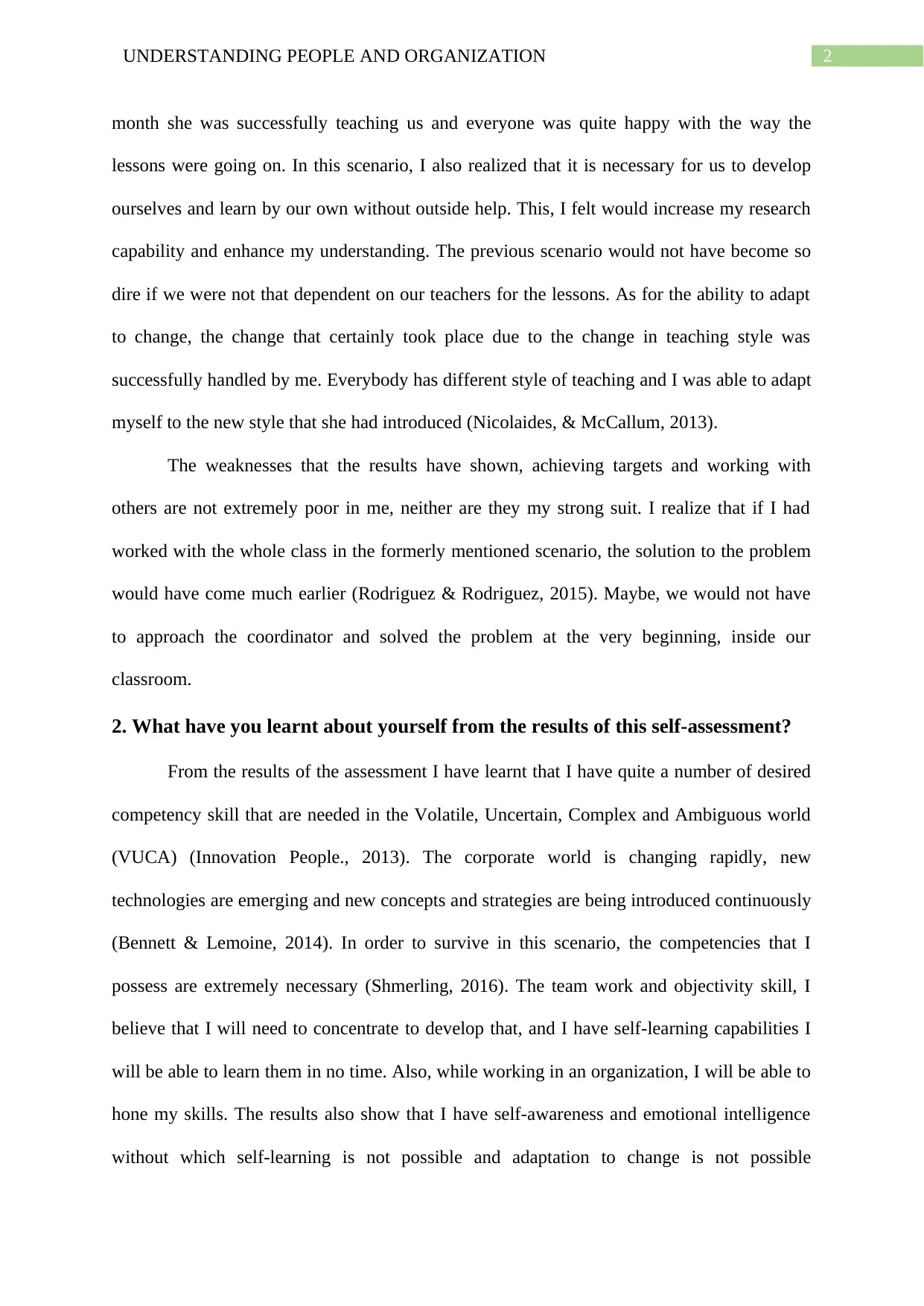
2UNDERSTANDING PEOPLE AND ORGANIZATION
month she was successfully teaching us and everyone was quite happy with the way the
lessons were going on. In this scenario, I also realized that it is necessary for us to develop
ourselves and learn by our own without outside help. This, I felt would increase my research
capability and enhance my understanding. The previous scenario would not have become so
dire if we were not that dependent on our teachers for the lessons. As for the ability to adapt
to change, the change that certainly took place due to the change in teaching style was
successfully handled by me. Everybody has different style of teaching and I was able to adapt
myself to the new style that she had introduced (Nicolaides, & McCallum, 2013).
The weaknesses that the results have shown, achieving targets and working with
others are not extremely poor in me, neither are they my strong suit. I realize that if I had
worked with the whole class in the formerly mentioned scenario, the solution to the problem
would have come much earlier (Rodriguez & Rodriguez, 2015). Maybe, we would not have
to approach the coordinator and solved the problem at the very beginning, inside our
classroom.
2. What have you learnt about yourself from the results of this self-assessment?
From the results of the assessment I have learnt that I have quite a number of desired
competency skill that are needed in the Volatile, Uncertain, Complex and Ambiguous world
(VUCA) (Innovation People., 2013). The corporate world is changing rapidly, new
technologies are emerging and new concepts and strategies are being introduced continuously
(Bennett & Lemoine, 2014). In order to survive in this scenario, the competencies that I
possess are extremely necessary (Shmerling, 2016). The team work and objectivity skill, I
believe that I will need to concentrate to develop that, and I have self-learning capabilities I
will be able to learn them in no time. Also, while working in an organization, I will be able to
hone my skills. The results also show that I have self-awareness and emotional intelligence
without which self-learning is not possible and adaptation to change is not possible
month she was successfully teaching us and everyone was quite happy with the way the
lessons were going on. In this scenario, I also realized that it is necessary for us to develop
ourselves and learn by our own without outside help. This, I felt would increase my research
capability and enhance my understanding. The previous scenario would not have become so
dire if we were not that dependent on our teachers for the lessons. As for the ability to adapt
to change, the change that certainly took place due to the change in teaching style was
successfully handled by me. Everybody has different style of teaching and I was able to adapt
myself to the new style that she had introduced (Nicolaides, & McCallum, 2013).
The weaknesses that the results have shown, achieving targets and working with
others are not extremely poor in me, neither are they my strong suit. I realize that if I had
worked with the whole class in the formerly mentioned scenario, the solution to the problem
would have come much earlier (Rodriguez & Rodriguez, 2015). Maybe, we would not have
to approach the coordinator and solved the problem at the very beginning, inside our
classroom.
2. What have you learnt about yourself from the results of this self-assessment?
From the results of the assessment I have learnt that I have quite a number of desired
competency skill that are needed in the Volatile, Uncertain, Complex and Ambiguous world
(VUCA) (Innovation People., 2013). The corporate world is changing rapidly, new
technologies are emerging and new concepts and strategies are being introduced continuously
(Bennett & Lemoine, 2014). In order to survive in this scenario, the competencies that I
possess are extremely necessary (Shmerling, 2016). The team work and objectivity skill, I
believe that I will need to concentrate to develop that, and I have self-learning capabilities I
will be able to learn them in no time. Also, while working in an organization, I will be able to
hone my skills. The results also show that I have self-awareness and emotional intelligence
without which self-learning is not possible and adaptation to change is not possible
⊘ This is a preview!⊘
Do you want full access?
Subscribe today to unlock all pages.

Trusted by 1+ million students worldwide
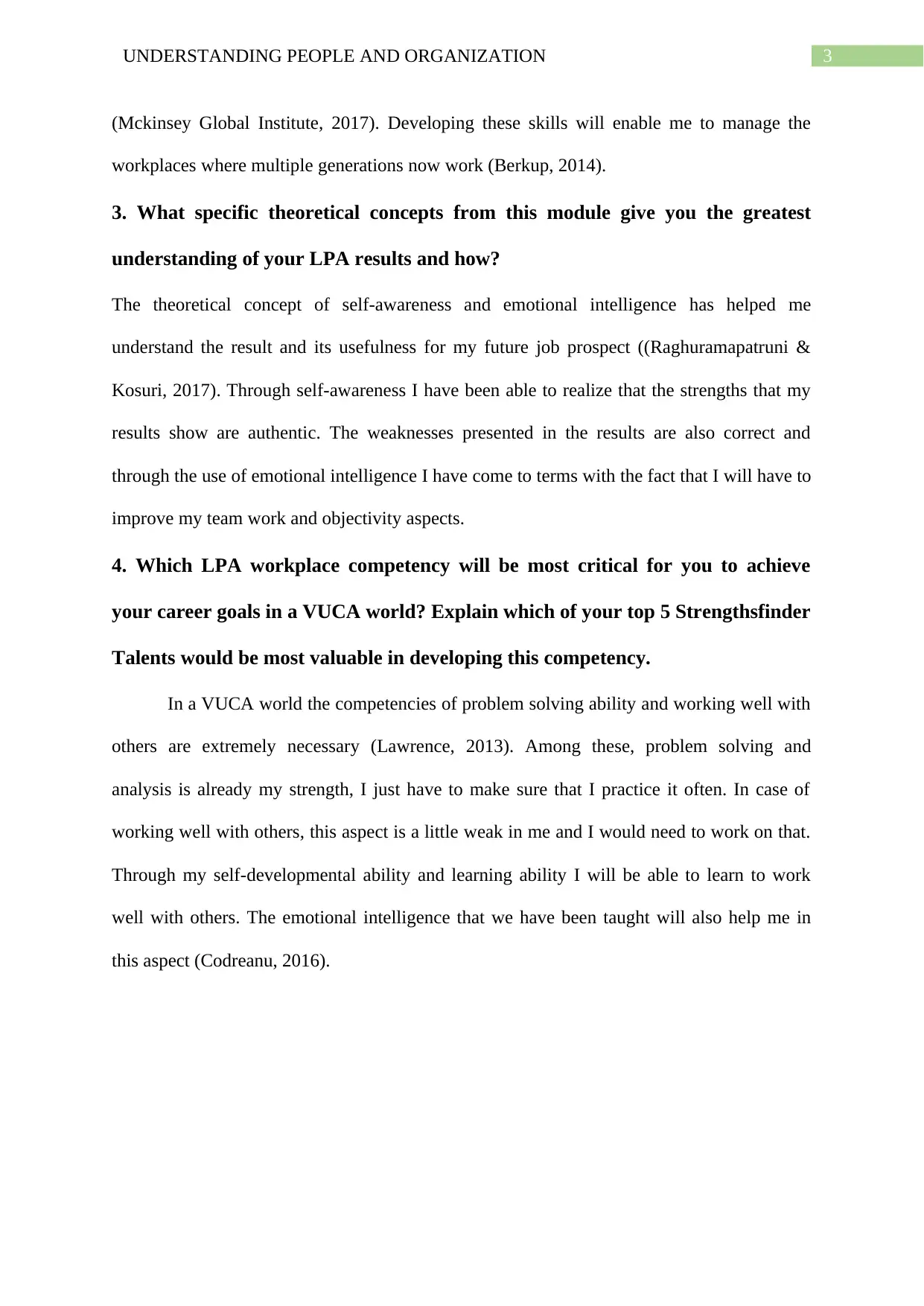
3UNDERSTANDING PEOPLE AND ORGANIZATION
(Mckinsey Global Institute, 2017). Developing these skills will enable me to manage the
workplaces where multiple generations now work (Berkup, 2014).
3. What specific theoretical concepts from this module give you the greatest
understanding of your LPA results and how?
The theoretical concept of self-awareness and emotional intelligence has helped me
understand the result and its usefulness for my future job prospect ((Raghuramapatruni &
Kosuri, 2017). Through self-awareness I have been able to realize that the strengths that my
results show are authentic. The weaknesses presented in the results are also correct and
through the use of emotional intelligence I have come to terms with the fact that I will have to
improve my team work and objectivity aspects.
4. Which LPA workplace competency will be most critical for you to achieve
your career goals in a VUCA world? Explain which of your top 5 Strengthsfinder
Talents would be most valuable in developing this competency.
In a VUCA world the competencies of problem solving ability and working well with
others are extremely necessary (Lawrence, 2013). Among these, problem solving and
analysis is already my strength, I just have to make sure that I practice it often. In case of
working well with others, this aspect is a little weak in me and I would need to work on that.
Through my self-developmental ability and learning ability I will be able to learn to work
well with others. The emotional intelligence that we have been taught will also help me in
this aspect (Codreanu, 2016).
(Mckinsey Global Institute, 2017). Developing these skills will enable me to manage the
workplaces where multiple generations now work (Berkup, 2014).
3. What specific theoretical concepts from this module give you the greatest
understanding of your LPA results and how?
The theoretical concept of self-awareness and emotional intelligence has helped me
understand the result and its usefulness for my future job prospect ((Raghuramapatruni &
Kosuri, 2017). Through self-awareness I have been able to realize that the strengths that my
results show are authentic. The weaknesses presented in the results are also correct and
through the use of emotional intelligence I have come to terms with the fact that I will have to
improve my team work and objectivity aspects.
4. Which LPA workplace competency will be most critical for you to achieve
your career goals in a VUCA world? Explain which of your top 5 Strengthsfinder
Talents would be most valuable in developing this competency.
In a VUCA world the competencies of problem solving ability and working well with
others are extremely necessary (Lawrence, 2013). Among these, problem solving and
analysis is already my strength, I just have to make sure that I practice it often. In case of
working well with others, this aspect is a little weak in me and I would need to work on that.
Through my self-developmental ability and learning ability I will be able to learn to work
well with others. The emotional intelligence that we have been taught will also help me in
this aspect (Codreanu, 2016).
Paraphrase This Document
Need a fresh take? Get an instant paraphrase of this document with our AI Paraphraser
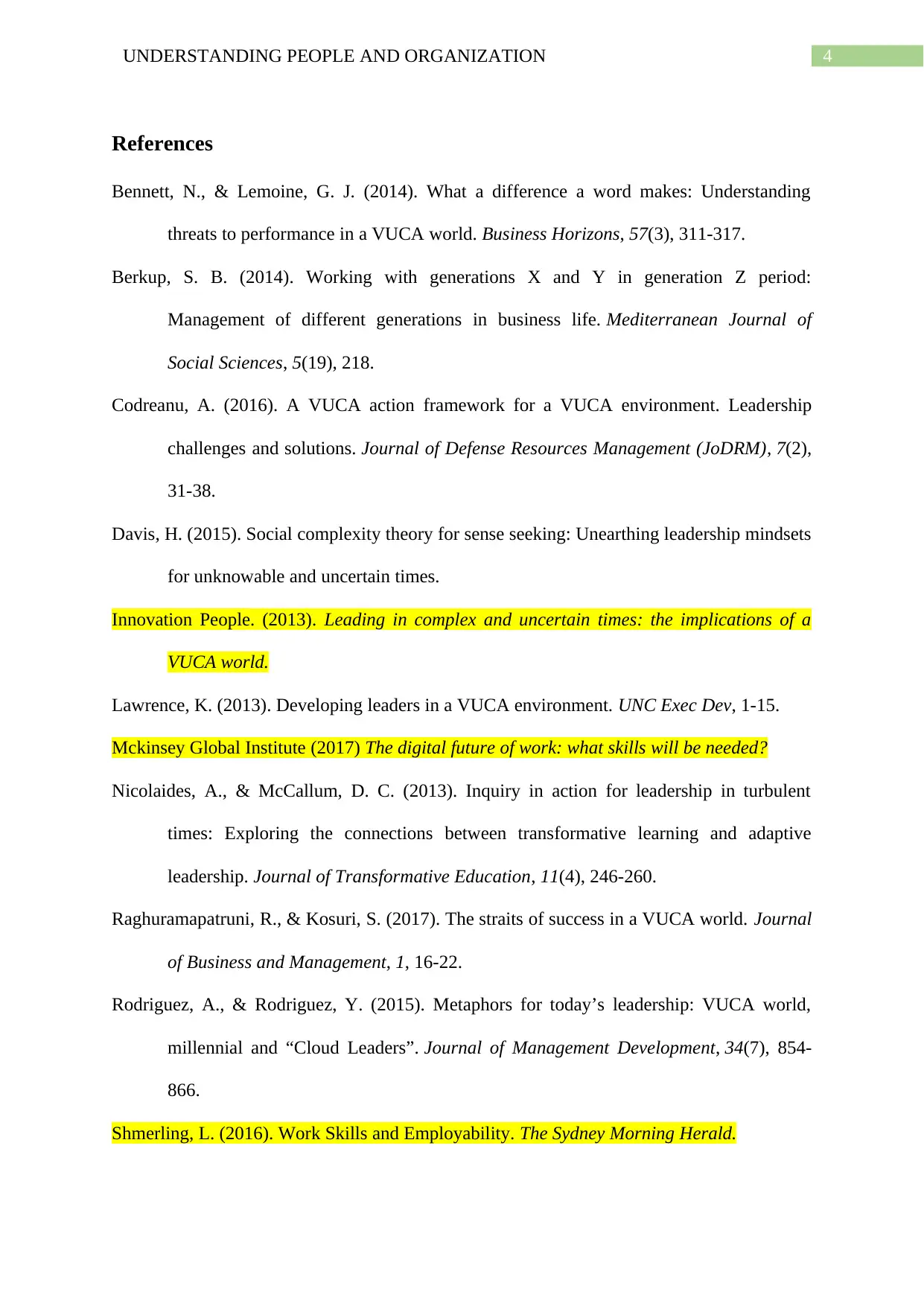
4UNDERSTANDING PEOPLE AND ORGANIZATION
References
Bennett, N., & Lemoine, G. J. (2014). What a difference a word makes: Understanding
threats to performance in a VUCA world. Business Horizons, 57(3), 311-317.
Berkup, S. B. (2014). Working with generations X and Y in generation Z period:
Management of different generations in business life. Mediterranean Journal of
Social Sciences, 5(19), 218.
Codreanu, A. (2016). A VUCA action framework for a VUCA environment. Leadership
challenges and solutions. Journal of Defense Resources Management (JoDRM), 7(2),
31-38.
Davis, H. (2015). Social complexity theory for sense seeking: Unearthing leadership mindsets
for unknowable and uncertain times.
Innovation People. (2013). Leading in complex and uncertain times: the implications of a
VUCA world.
Lawrence, K. (2013). Developing leaders in a VUCA environment. UNC Exec Dev, 1-15.
Mckinsey Global Institute (2017) The digital future of work: what skills will be needed?
Nicolaides, A., & McCallum, D. C. (2013). Inquiry in action for leadership in turbulent
times: Exploring the connections between transformative learning and adaptive
leadership. Journal of Transformative Education, 11(4), 246-260.
Raghuramapatruni, R., & Kosuri, S. (2017). The straits of success in a VUCA world. Journal
of Business and Management, 1, 16-22.
Rodriguez, A., & Rodriguez, Y. (2015). Metaphors for today’s leadership: VUCA world,
millennial and “Cloud Leaders”. Journal of Management Development, 34(7), 854-
866.
Shmerling, L. (2016). Work Skills and Employability. The Sydney Morning Herald.
References
Bennett, N., & Lemoine, G. J. (2014). What a difference a word makes: Understanding
threats to performance in a VUCA world. Business Horizons, 57(3), 311-317.
Berkup, S. B. (2014). Working with generations X and Y in generation Z period:
Management of different generations in business life. Mediterranean Journal of
Social Sciences, 5(19), 218.
Codreanu, A. (2016). A VUCA action framework for a VUCA environment. Leadership
challenges and solutions. Journal of Defense Resources Management (JoDRM), 7(2),
31-38.
Davis, H. (2015). Social complexity theory for sense seeking: Unearthing leadership mindsets
for unknowable and uncertain times.
Innovation People. (2013). Leading in complex and uncertain times: the implications of a
VUCA world.
Lawrence, K. (2013). Developing leaders in a VUCA environment. UNC Exec Dev, 1-15.
Mckinsey Global Institute (2017) The digital future of work: what skills will be needed?
Nicolaides, A., & McCallum, D. C. (2013). Inquiry in action for leadership in turbulent
times: Exploring the connections between transformative learning and adaptive
leadership. Journal of Transformative Education, 11(4), 246-260.
Raghuramapatruni, R., & Kosuri, S. (2017). The straits of success in a VUCA world. Journal
of Business and Management, 1, 16-22.
Rodriguez, A., & Rodriguez, Y. (2015). Metaphors for today’s leadership: VUCA world,
millennial and “Cloud Leaders”. Journal of Management Development, 34(7), 854-
866.
Shmerling, L. (2016). Work Skills and Employability. The Sydney Morning Herald.
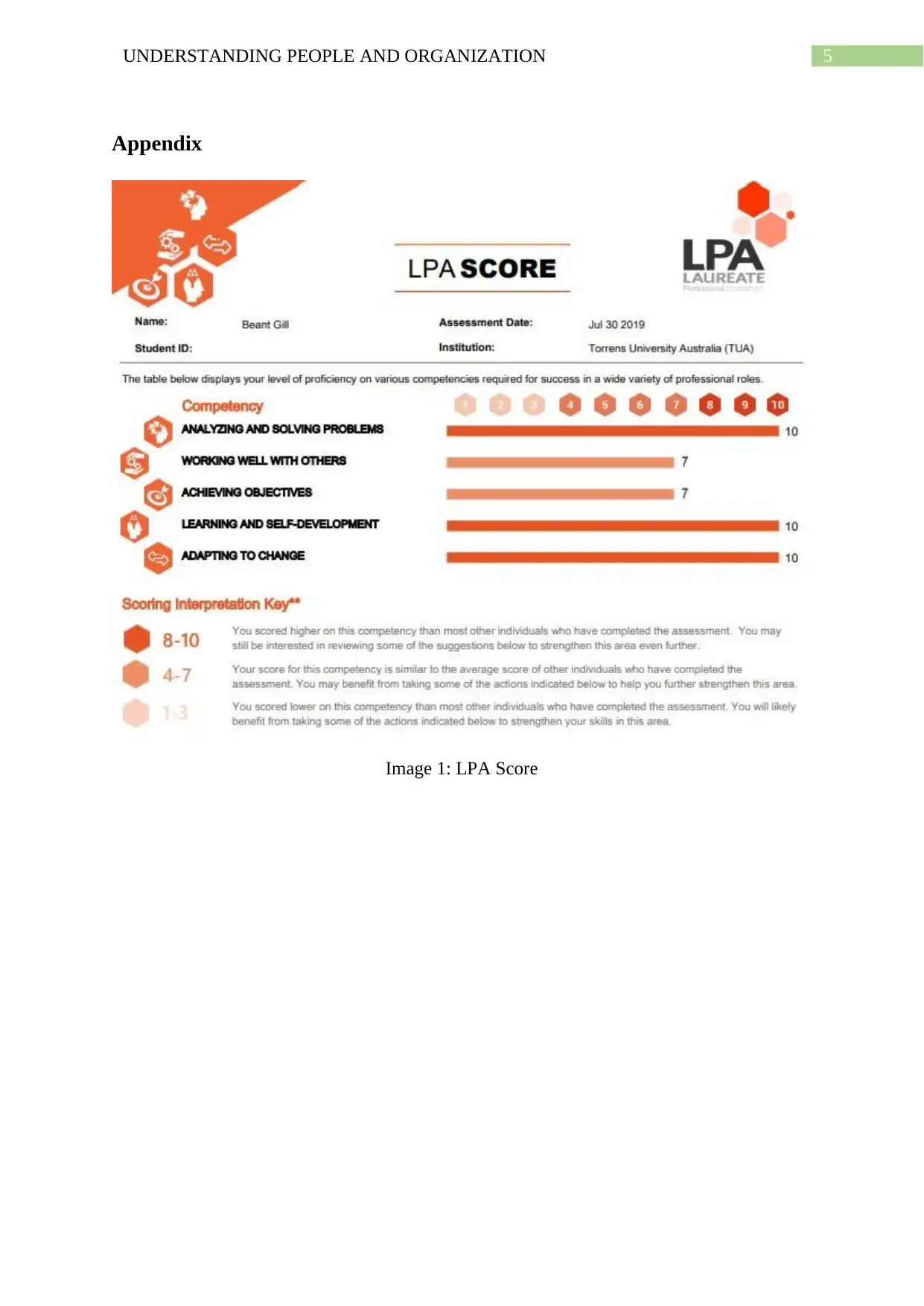
5UNDERSTANDING PEOPLE AND ORGANIZATION
Appendix
Image 1: LPA Score
Appendix
Image 1: LPA Score
⊘ This is a preview!⊘
Do you want full access?
Subscribe today to unlock all pages.

Trusted by 1+ million students worldwide
1 out of 6
Related Documents
Your All-in-One AI-Powered Toolkit for Academic Success.
+13062052269
info@desklib.com
Available 24*7 on WhatsApp / Email
![[object Object]](/_next/static/media/star-bottom.7253800d.svg)
Unlock your academic potential
Copyright © 2020–2025 A2Z Services. All Rights Reserved. Developed and managed by ZUCOL.





